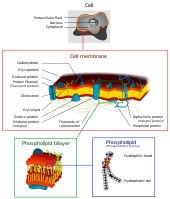
Photo from wikipedia
Background The antibiotic resistance and biofilm formation of pathogenic microbes exacerbate the difficulties of anti-infection therapy in the clinic. The structural modification of antimicrobial peptides (AMP) is an effective strategy… Click to show full abstract
Background The antibiotic resistance and biofilm formation of pathogenic microbes exacerbate the difficulties of anti-infection therapy in the clinic. The structural modification of antimicrobial peptides (AMP) is an effective strategy to develop novel anti-infective agents. Method Seventeen amino acids (AA) in the longer chain of EeCentrocin 1 (from the edible sea-urchin Echinus esculentus) were truncated and underwent further modification. To produce lead peptides with low toxicity and high efficacy, the antimicrobial activity or cytotoxicity of peptides was evaluated against various multidrug-resistant bacteria/fungi or mammalian cells in vivo/ in vitro. In addition, the stability and modes of action of the lead peptide were investigated. Findings EC1-17KV displayed potent activity and an expanded antimicrobial spectrum, especially against drug-resistant gram-negative bacteria and fungi, attributable to its enhanced amphiphilicity and net charge. In addition, it exhibits bactericidal/fungicidal activity and effectively increased the animal survival rate and mitigated the histopathological damage induced by multidrug-resistant P. aeruginosa or C. albicans in infected mice or G. mellonella. Moreover, EC1-17KV had a poor ability to induce resistance in bacteria and fungi and exhibited desirable high-salt/high-temperature tolerance properties. In bacteria, EC1-17KV promoted divalent cation release to damage bacterial membrane integrity. In fungi, it changed C. albicans membrane fluidity to increase membrane permeabilization or reduced hyphal formation to suppress biofilm formation. Interpretation EC1-17KV is a promising lead peptide for the development of antimicrobial agents against antibiotic resistant bacteria and fungi. Funding This work was funded by the National Natural Science Foundation of China (No. 81673483, 81803591); National Science and Technology Major Project Foundation of China (2019ZX09721001-004-005); National Key Research and Development Program of China (2018YFA0902000); "Double First-Class" University project (CPU2018GF/GY16); Natural Science Foundation of Jiangsu Province of China (No. BK20180563); and A Project Funded by the Priority Academic Program Development of Jiangsu Higher Education Institutions.
Journal Title: EBioMedicine
Year Published: 2020
Link to full text (if available)
Share on Social Media: Sign Up to like & get
recommendations!